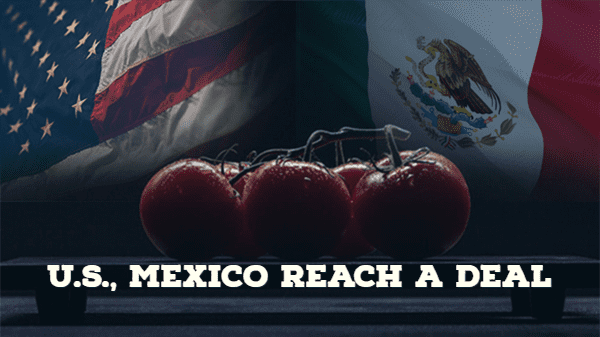
PRESS RELEASE: NOGALES, ARIZ., SEPTEMBER 19, 2019 – A new Tomato Suspension Agreement will ensure continued market access for Mexican tomatoes but it comes at an extreme cost to importers, who will face unjustified costs and disruption to business due to the controversial Border Inspection Mechanism, which acts as a technical barrier to trade.
“It is outrageous that Commerce used false justifications to introduce what essentially acts as a quota or volume control method,” said Lance Jungmeyer, President of the Fresh Produce Association of the Americas (FPAA) BB #:144354, adding, “It is completely unnecessary to require USDA to conduct quality inspections on an item that has already demonstrated a historical pass rate of 99.76%.”
It is estimated that constructing new warehouse space for inspections will cost importers more than $200 million upfront, plus another $50 million a year in fees and other costs.
Senator Martha McSally of Arizona sent a letter to Commerce Sept. 19, requesting that shipments be released from the inspection requirement in the event that USDA is not able to conduct a timely inspection within 24 hours. While the new agreement states that USDA will conduct and complete the inspection “normally within 24 hours,” the new agreement falls short of providing a waiver in case the inspection cannot be done.
Vine-ripened tomatoes are a sensitive perishable item that continue to ripen after harvest, and typically must be delivered to customers within seven days after harvest. Adding a day or two for inspection at the border reduces shelf life.
“USDA has assured us the inspections can be done within 24 hours. If that’s really the case, then there should be no problem including language for a waiver in the instance the deadline can’t be met,” Jungmeyer said.
FPAA is pleased that the Mexican growers were able to secure some changes in the agreement that make the agreement more palatable, such as clarifying certain technical definitions. But in the end, the imposition of a non-tariff trade barrier represents a step backward in international trade.
“The United States has fought and fought for decades to reduce phony and unjustifiable non-tariff barriers to trade. Now that Commerce has pushed this inspection, other countries may be emboldened to push for similar restrictions on imports of U.S. foods into their countries,” Jungmeyer said, adding, “It is truly short-sighted.”
Importers of other items that legitimately require inspection, such as avocados, citrus and table grapes, now could face economic damage due to slowdowns in getting inspections, considering the massive amount of new inspections that must occur.
“Food is a just-in-time business,” Jungmeyer said. “All around, this is a total step backward.”
About the Fresh Produce Association of the Americas
The FPAA is a nonprofit trade association representing over 100 U.S. companies headquartered in Nogales, Arizona. FPAA members are involved in importing, sales and distribution of fresh fruits and vegetables grown in Mexico. The FPAA leverages the efforts of private companies and partner-associations to increase the consumption of fresh fruits and vegetable from Mexico.
PRESS RELEASE: NOGALES, ARIZ., SEPTEMBER 19, 2019 – A new Tomato Suspension Agreement will ensure continued market access for Mexican tomatoes but it comes at an extreme cost to importers, who will face unjustified costs and disruption to business due to the controversial Border Inspection Mechanism, which acts as a technical barrier to trade.
“It is outrageous that Commerce used false justifications to introduce what essentially acts as a quota or volume control method,” said Lance Jungmeyer, President of the Fresh Produce Association of the Americas (FPAA) BB #:144354, adding, “It is completely unnecessary to require USDA to conduct quality inspections on an item that has already demonstrated a historical pass rate of 99.76%.”
It is estimated that constructing new warehouse space for inspections will cost importers more than $200 million upfront, plus another $50 million a year in fees and other costs.
Senator Martha McSally of Arizona sent a letter to Commerce Sept. 19, requesting that shipments be released from the inspection requirement in the event that USDA is not able to conduct a timely inspection within 24 hours. While the new agreement states that USDA will conduct and complete the inspection “normally within 24 hours,” the new agreement falls short of providing a waiver in case the inspection cannot be done.
Vine-ripened tomatoes are a sensitive perishable item that continue to ripen after harvest, and typically must be delivered to customers within seven days after harvest. Adding a day or two for inspection at the border reduces shelf life.
“USDA has assured us the inspections can be done within 24 hours. If that’s really the case, then there should be no problem including language for a waiver in the instance the deadline can’t be met,” Jungmeyer said.
FPAA is pleased that the Mexican growers were able to secure some changes in the agreement that make the agreement more palatable, such as clarifying certain technical definitions. But in the end, the imposition of a non-tariff trade barrier represents a step backward in international trade.
“The United States has fought and fought for decades to reduce phony and unjustifiable non-tariff barriers to trade. Now that Commerce has pushed this inspection, other countries may be emboldened to push for similar restrictions on imports of U.S. foods into their countries,” Jungmeyer said, adding, “It is truly short-sighted.”
Importers of other items that legitimately require inspection, such as avocados, citrus and table grapes, now could face economic damage due to slowdowns in getting inspections, considering the massive amount of new inspections that must occur.
“Food is a just-in-time business,” Jungmeyer said. “All around, this is a total step backward.”
About the Fresh Produce Association of the Americas
The FPAA is a nonprofit trade association representing over 100 U.S. companies headquartered in Nogales, Arizona. FPAA members are involved in importing, sales and distribution of fresh fruits and vegetables grown in Mexico. The FPAA leverages the efforts of private companies and partner-associations to increase the consumption of fresh fruits and vegetable from Mexico.



